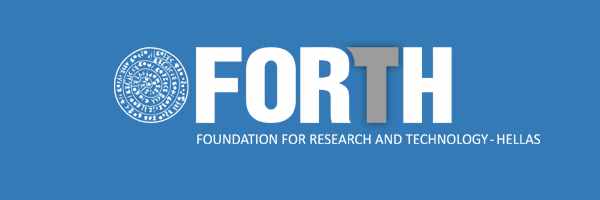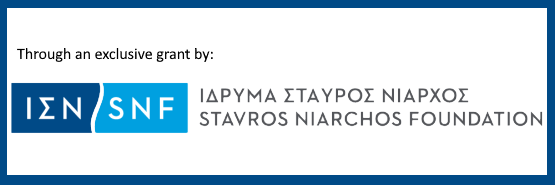Ref. 1224 Rethymno 13/9/2018
The Institute for Mediterranean Studies (IMS) of the Foundation for Research and Technology Hellas (FORTH), in the framework of the project ARCHERS, aimed at reducing or even reversing the brain drain, which is funded by an exclusive donation of the Stavros Niarchos Foundation, is seeking to recruit one post-doctoral fellow.
Job Description The research objectives of the post include: rectification and digitization of plans/maps/drawings, the image processing of satellite imagery datasets, the contribution in GIS analysis and modeling, the participation in a number of geophysical fieldwork activities in Greece, the delivery of geoinformatic lectures in international seminars that will be organized by the Laboratory of Geophysical – Satellite Remote Sensing and Archaeo-environment of FORTH, the active participation in the publications of the project’s results in international peer reviewed journals and conferences. Candidates need to have a strong stimulus and be able to collaborate and interact constructively within an international team with various disciplines.
Eligibility criteria
PhD in Earth and Environmental Sciences (25%).
Experience in satellite remote sensing processing, GIS applications, Digital Elevation Models (DEMs) analysis, focusing in the development of multi-criteria decision analysis techniques, risk assessment analysis and landscape research (25%).
Desirable qualifications
Publications in peer review journals and/or international conferences (15%). Participation in a number of research projects and conferences (national/international) dealing with satellite remote sensing, GIS and geophysical prospection (10%).
Knowledge of GIS software’s (ArcGIS, MapInfo, GRASS, Quantum GIS), satellite remote sensing software’s (ERDAS, ENVI) and topographic mapping through GPS (10%).
Teaching experience in the fields of satellite remote sensing and GIS applications (10%).
Good knowledge of Greek and English language (5%).
Location: IMS-FORTH, Rethymno Crete, GREECE
Start Date: 1rst of January, 2019
Duration of appointment: 12 months (with possibility of extension according to the needs of the project).
Application Submission Interested candidates who meet the aforementioned requirements are kindly asked to submit their applications electronically (by e-mail), no later than the October 8th, 2018, 23:59 (Greece Time – Eastern European Time [GMT +3]).
Applications should be sent by electronic mail to the email address of the Secretariat of the Institute for Mediterranean Studies (info@ims.forth.gr) with e-mail Subject “One Post-Doctoral “Stavros Niarchos Foundation – FORTH Fellowship” within the project ARCHERS”.
Replacement of the proposal, correction or addition of any missing supporting documents is only allowed before the closing date and time for the submission of proposals.
Proposals submitted after this date and time will be rejected as overdue and will not be evaluated. Incomplete applications, or application with qualifications mentioned either in the proposal or in the CV, but not documented by the submission of the relevant supporting documents, will not be taken into account and will not be rated in the final classification of the candidates.
For more information, prospective candidates may contact info@ims.forth.gr or call (+30)2831056627 (Ms Georgia Papadaki) or contact Dr Apostolos Sarris (asaris@ret.forthnet.gr), Coordinator of the subproject, who may provide more specific information about the tasks involved.
In order to be considered, the application must include:
Application Form
Detailed curriculum vitae (CV) of the candidate
Copies of academic titles/transcripts
Evaluation Process All applications submitted on time and with all requested documentation will be evaluated and ranked and the candidate with the most appropriate qualifications to perform the research will be selected.
All applications will be evaluated by the Evaluation Committee on a scale of 1-100 based on the criteria outlined above using the weight factors which are indicated above.
The Evaluation Committee consists of 3 full and 3 alternate members from FORTH’s staff. It is mandatory that one of the full members is the coordinator of the Program. The Evaluation Committee is appointed by decision of the Board of Directors of FORTH and remains the same throughout the Program. Under penalty of rejection of the proposal, the members of the Evaluation Committee are not allowed to have consanguinity (up to the third degree) or martial relation to any candidate. The Committee’s recommendations are forwarded to the Director of IMS-FORTH.
Evaluation Results The evaluation results will be posted on the website of IMS-FORTH (http://ims.forth.gr) and all candidates will be informed by e-mail about the posting of the results.
Candidates have the right to appeal against the selection decision within five (5) working days from the date of the announcement of the results. During these five days they have the right to access the personal files and individual evaluation of the candidates provided this is done in compliance with the prescribed information under G/EX/4163-1/06.07.2012 document for the Protection of Personal Data. All information related to the selection process will be available at the Secretariat of IMS-FORTH during regular business hours 8:00am-4:00pm Greece Time. Appeals have to be submitted in writing (in person/registered mail/e-mail received by 4:00 pm Greece Time five (5) working days after the posting of the evaluation results. Appeals will be considered by a Committee and the Committee’s decisions are final.
After the expiration of the appeals period and after evaluating any submitted appeals the Committee finalizes the ranking of candidates. The Committee will then ask the person on the top of the ranking list to provide original documents (or certified copies of them) and for a written acceptance of the position. These will have to be provided within three (3) working days. In case of non-acceptance of the position by the candidate, or the lapse of the deadline for providing the original documents, the Committee will ask the first runner-up to accept the position using the same procedure. This process will be repeated until a candidate accepts the position. If no candidate accepts the position, the position will be declared vacant.
Other terms and conditions
1. The award of projects will be performed in accordance with the Call for Action “ARCHERS: Advancing Young Researchers’ Human Capital in Cutting Edge Technologies in the Preservation of Cultural Heritage and the Tackling of Societal Challenges”.
2. Certificates of higher education (undergraduate and postgraduate) that are among the required or desirable qualifications and have been awarded by foreign institutions, must be accompanied by Δ.Ο.Α.Τ.Α.Π. (Hellenic NARIC) recognition certificates or the foreign institution awarding the title should be included in the List of Foreign Higher Education Institutions recognized by the Hellenic NARIC (http://62.103.84.30/2.php). Throughout the duration of the Program, if there is a need of replacing staff selected under this Call, substitution will be made by selecting – on the basis of rating / gathered points – another candidate (s) from the drafted ranking list.
3. Please note that this Call may be revoked at any stage and no claim can be made by candidates against IMS-FORTH.
4. Participation implies full acceptance of the terms of this Call for expressions of interest.
5. The present Call will be published on the IMS-FORTH website (http://ims.forth.gr), on the website of the Transparency Program (ΔΙΑΥΓΕΙΑ) of the Ministry of Administrative Reconstruction and elsewhere as requested by the funding body.

